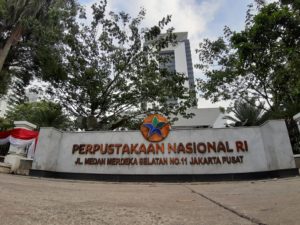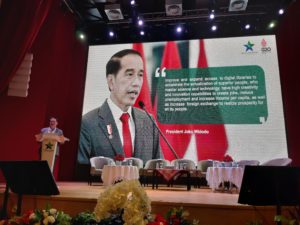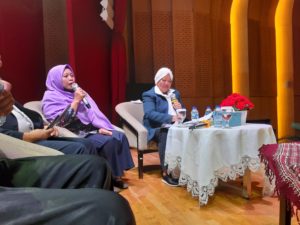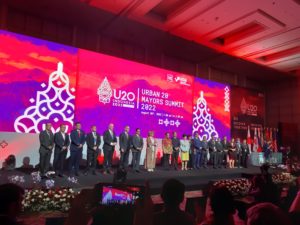Recovering stronger, recovering together in cities: libraries engage at G20 Urban20 Conference
02 September 2022
IFLA has participated for the first time in a G20 related summit, the Urban 20 summit, held in Jakarta, Indonesia. Drawing on the excellent work and examples of the Indonesian library field, we underlined the importance of inclusive education policies, mobilising core infrastructure such as libraries, and basing decision on cultural insights.

The Urban 20 (U20) – the equivalent of the G20 process for mayors – took place for the 5th time on 30-31 August 2022, under the Indonesia Presidency of the G20. Bringing together city mayors from major cities across the world’s biggest economies, it provides an opportunity both to share experience between urban leaders and to influence the discussions of national leaders.
As an official U20 Partner, IFLA not only was invited to the formal summit, but also, with the very welcome support of the National Library of Indonesia, was able to hold a side event focused on a key theme of the meeting – how to ensure that everyone has the skills to thrive in the economies of today and tomorrow. This in turn reflects the topic of Indonesia’s G20 Presidency as a whole: Recovering Together, Recovering Stronger.
Enabling Cities, Caring Cities
The event at the National Library of Indonesia brought together representatives of libraries, as well as the President of the Asia Pacific Bureau of Adult Education to talk about how better to mobilise key actors in any city’s education infrastructure – libraries and adult education players. The event was moderated by Dr Woro Titi Haryanti, Senior Librarian of the National Library of Indonesia.

The Head of the Indonesia’s National Library, Dr Muhammad Syarif Bando set the scene with a keynote that underlined both the practical ways in which libraries in Indonesia, supported by the National Library, are ensuring equitable access to skills to support inclusive employment and growth.
Highlighting support for the work of libraries from the President down, he underlined the work to develop institutions across the country as open spaces for learning, creativity and sharing, working in partnership with local mayors.
Nani Zulminarni, President of the Asia-Pacific Bureau of Adult Education focused on the importance of inclusion, with women and older people needing particular attention. The adult education sector is varied, but with the right partnerships can and does make a huge contribution.
Nirwan Ahmad Arsuka, founder of the Moving Library – a network of mobile libraries across Indonesia – offered an example of a successful collaboration between the National Library and a civil society organisation, bringing books, reading and skills even to the most remote areas and people.
Dr Syaifullah Muhammed brought in the academic library perspective from Banda Aceh, where the library had worked with local Patchouli producers in order to train them in how to process this into perfume, and so be able to sell much higher-value products for export.
Meanwhile in Gunung Kidul Regency, Agung Wibawa noted the rich variety of training courses provided in libraries there, from computer training to marketing, batik and HIV counselling. In many of these, there was a strong focus on supporting economic activity.

Rodinatun, a housewife from Bekasi provided an excellent example of this, telling the story of how visiting the library led her to go from simply collecting and reselling plastic bottles to creating craft products, and then becoming a literacy teacher and coach for others in her community.
The event closed with a set of recommendations to mayors. These centred on the importance of government supporting and working with community education actors such as libraries and adult education workers as friends and partners, not as inferiors.
It was vital to take a proactive approach, mobilising communities themselves to support, and to recognise and welcome every small step. Similarly, we needed to take a caring approach – a development policy with a heart – and one that both drew on and supported local culture.
U20 Summit
The Summit itself took place later the same day, chaired by the Governors of Jakarta and of West Java.
As Emilia Saiz, Secretary-General of United Cities and Local Governments pointed out in her opening words, the Pandemic had created a space for new thinking about urbanisation, as well as other policy goals. However, this window was closing, and so it was imperative to exploit it while it was there. We had already seen some progress – issues such as mental health, inclusive digitalisation, and culture were receiving more attention than before.
The Governor of Jakarta called for public spaces where people come together, while the Governor of West Java underlined the need to think more about wellbeing – both making points which support the need for a strong library field. The latter also highlighted the importance of supporting small-scale entrepreneurship, echoing the examples shared in the morning’s side-event.

In sessions focusing on disruption and inclusion, as well as energy and transport, others echoed some of these key points. Randall Williams, Mayor of Tshwane, South Africa, called for adaptive education systems, flexing to meet people’s needs from the youngest ages. Jess Scully, Deputy Lord Mayor of Sydney, Australia talked about partnerships of stakeholders in order to seize all opportunities to promote entrepreneurship and learning. In both cases, libraries have a key role to play.
In its own submitted statement, IFLA underlined the importance of focusing on equity and adaptiveness in education, highlighting the example of Rodinatun mentioned above. Governments at all levels needed to support and work with libraries and adult education actors, as well as their own understanding of local culture, in order to succeed.
The final communiqué from the summit makes a number of helpful points for library advocacy:
- The need to make culture and heritage part of wider social protection and cohesion strategies
- The importance of accessible services and activities within neighbourhoods, in line with the 15-Minute City concept
- The imperative of providing not just connectivity, but also digital skills and literacy, as well as the protection of rights online
These all offer welcome references for libraries in their advocacy work with mayors as well as national authorities!
IFLA is very grateful to the National Library of Indonesia for its support in hosting the side-event, as well as to all in the Indonesian library community who contributed to it.